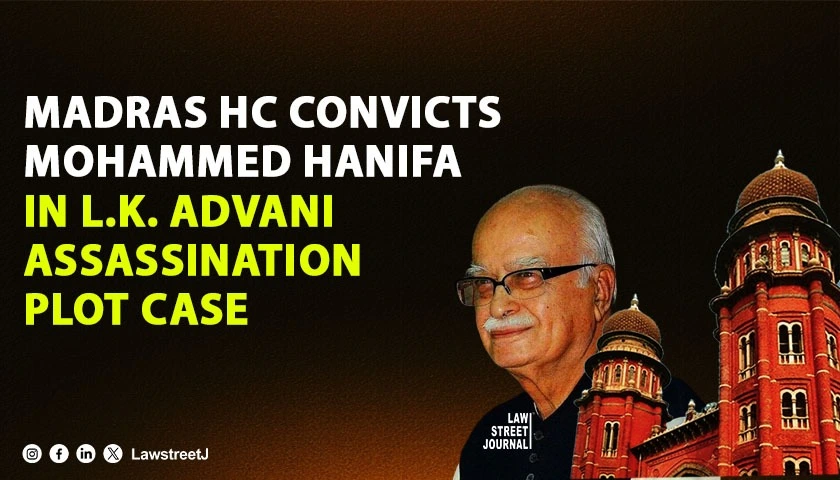Chennai: The Madras High Court has set aside a trial court order acquitting Mohammed Hanifa @ Tenkasi Hanifa, in a case involving a planned bomb attack on former Home Minister L.K. Advani during his Rath Yatra in Madurai in 2011, holding that the prosecution proved the case beyond reasonable doubt on the strength of consistent and cogent evidence.
A Division Bench of Justices P. Velmurugan and L. Victoria Gowri made these observations while allowing the State’s appeal challenging the Principal Sessions Court, Dindigul’s judgment dated December 20, 2018, which had acquitted the accused.
The court was hearing Crl.A(MD) No. 475 of 2019 filed under Section 378(1) of the Criminal Procedure Code by the State represented by the Additional Superintendent of Police, Special Investigation Division, Crime Branch CID, Coimbatore.
The prosecution case arose from Crime No. 237/2011 registered at Tirumangalam Taluk Police Station concerning an attempt on former Home Minister L.K. Advani’s life through a planted bomb. A non-bailable warrant was issued against Mohammed Hanifa, who was absconding. Based on intelligence that he was hiding in Batlagundu, Dindigul District, on July 8, 2013, at about 10 a.m., the Deputy Superintendent of Police, along with police personnel and revenue officials, attempted to apprehend him.
While executing the warrant, the accused allegedly attempted to murder DSP Mr. Karthikeyan by attacking him with a long knife. The DSP escaped without injury, and accompanying police personnel overpowered the accused and seized the weapon. The accused then voluntarily confessed in the presence of the VAO and Village Assistant, leading to the discovery of two knives, two gel bags, two detonators, a copy of Daily Thanthi dated July 5, 2013, a white paper with a hit list of prominent Hindu leaders, and a small bag, all seized under mahazars. The accused also identified a location where he had hidden explosive materials, from which 18 electronic detonators and 18 gel bags were seized.
A case was registered in Crime No. 240/2013 under Sections 353, 307, and 153(A) IPC, Section 16(1)(b) of the Unlawful Activities (Prevention) Act, 1967, and Sections 4(a)(i) and 4(b)(ii) of the Explosive Substances Act, 1908. The case was committed to the Sessions Court, which framed charges and examined 21 witnesses, marking 31 documents and seven material objects. However, the trial court acquitted the accused on December 20, 2018.
The Additional Public Prosecutor argued that the trial court erroneously emphasized non-examination of all occurrence witnesses, citing Takdir Samsuddin Sheikh vs. State of Gujarat (AIR 2012 SC 37), which held that the quality of witnesses matters, not their number. He submitted that the trial court misconstrued procedural corrections in seizure mahazars, ignoring PW15’s clear explanation that corrections were made after consulting higher officials. He relied on Dr. Sunil Kumar Sambhudayal Gupta vs. State of Maharashtra (AIR 2012 SC 3311), which held that properly clarified procedural irregularities cannot form the basis for rejecting credible evidence.
The prosecutor further argued that the trial court erroneously concluded that witnesses were unclear about the vehicles used, ignoring that evidence showed PW1 travelled in his official jeep while PWs 2 and 3 travelled in a tempo van with other personnel. He cited Ganapat vs. State of Haryana (2011 Crl.J 701 SC), holding that minor contradictions should not be given undue importance when core facts remain consistent.
He also contended that the trial court’s focus on the absence of arms among police personnel reflected a fundamental misunderstanding of operational protocols, as the mission was execution of a non-bailable warrant, not riot control. He relied on Anil Kumar vs. State of UP (AIR 2004 SC 4662), emphasizing that the nature of duty should take precedence over peripheral factors.
The prosecutor further submitted that the trial court’s finding that PW2 and PW5 were unable to identify the author of the confession was erroneous, citing Aghnoo Nagewia vs. State of Bihar (AIR 1966 SC 119), which clarified that while confessions to police officers are generally inadmissible, material evidence derived from such confessions is admissible if it leads to the discovery of relevant facts.
On the other hand, the accused’s counsel argued that there were corrections in the mahazars and Form-95s which witnesses could not explain, creating doubt. He submitted that witnesses were unclear about the vehicles used, no weapons were taken despite the accused being a hardcore criminal, only four of twelve occurrence witnesses were examined, no cell phone or money was recovered at arrest, and there were material contradictions regarding recovery and the surrounding of the accused.
The defence further contended that under Rule 128(2) of the Explosives Rules, 2008, if any officer seizes explosives, he shall forthwith report to the Chief Controller and Controller; however, PW21 admitted no such information was sent. Counsel highlighted numerous investigation defects, including non-production of the CD file, toll records, failure to send knives to the fingerprint expert, non-production of photographs, and non-examination of the tempo van driver.
The court held that the case against the accused in Crime No. 237/2011 was for a heinous crime—attempting to take away former Home Minister L.K. Advani’s life through a planted bomb. Since the accused was absconding, a non-bailable warrant was issued, and it was the police’s duty to execute it. The court observed:
“Since the team of officers, being government officials, went on official duty to execute the NBW and arrested the respondent who absconded in order to escape from the clutches of law in a pending criminal case, it cannot be expected that prior intimation should be given to the local police.”
The court noted that PW5-VAO, an independent witness with prior permission of his superior, clearly deposed about the occurrence and recovery. PW10-Village Administrative Officer also spoke about the confession. Justice Velmurugan held that under Section 27 of the Indian Evidence Act, 1872, if confessions lead to the recovery of material evidence, that portion of the confession is admissible, and the prosecution proved the recovery through PW5 and PW10’s evidence.
The court further observed:
“In cases of this nature, one cannot expect totally independent or public witnesses. The accused was absconding and hiding in a secret place, and the officials, in order to execute the NBW, formed a team and went to the place secretly to secure the respondent.”
It held:
“Merely because the witnesses were officials of the police and revenue departments, the Court cannot simply discard their evidence unless it finds it unreliable. Once the Court finds that the evidence of such witnesses is reliable, cogent, consistent, and inspires confidence, conviction can be recorded.”
Additionally, the court noted that while Section 162 CrPC states that statements recorded by police officials are not admissible, in cases where police officials themselves are occurrence witnesses, if their evidence inspires confidence and the defence has not shown reasons to discard it, courts can rely upon their testimony.
The court concluded:
“Though the learned counsel for the respondent and the trial court pointed out certain contradictions and discrepancies, on a careful perusal of the entire records, oral and documentary evidence, and more so the antecedents of the respondent, this Court finds that the contradictions pointed out are not material contradictions that go to the root of the prosecution case.”
“A careful reading of the evidence of PWs 1, 2, 3, 5, 10, and 12, and the mahazar witnesses, along with the expert opinion and reports, shows that the recovery is proved, and as per the expert opinion, the recovered materials are explosive substances. Therefore, this Court finds that the prosecution has proved its case beyond reasonable doubt.”
The court set aside the trial court’s judgment and directed the accused to appear on October 28, 2025, for questioning before imposition of sentence.
Mr. T. Senthil Kumar, Additional Public Prosecutor, appeared for the appellant. Mr. S.M.A. Jinnah appeared for the respondent.
Case Title: The State vs. Mohammed Hanifa @ Tenkasi Hanifa




![TN Medical Council declares change of gender identity of LGBTQIA+ as misconduct [Read Notification]](/secure/uploads/2022/12/lj_5268_5cebb05a-97fb-40fb-8045-25cdf8f4207a.jpg)
![Madras High Court Directs Tamil Nadu Government to Ensure Quota for Transgenders in Local Body Elections [Read Order]](/secure/uploads/2023/08/lj_2507_7a03d113-08b1-4670-b6fb-9058aee481d0.jpg)
![Anti Corruption sleuths acted like "puppets in The Muppet Show", HC notice to ex TN CM in disproportionate assets case [Read Order]](/secure/uploads/2023/09/lj_8675_7b37fc02-1b2d-4f4a-9816-3df20545b37e.jpg)




